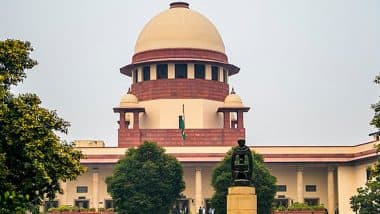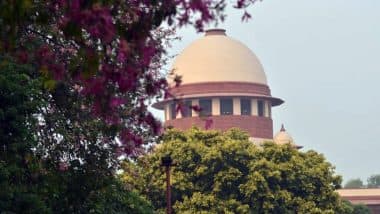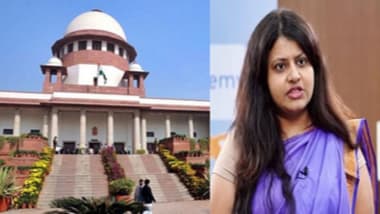New Delhi, November 4: The Supreme Court has issued a slew of directions aimed at standardising and improving the transparency of policies governing permanent remission to convicts in the country. The directions of the bench comprising Justices Abhay S Oka and Augustine George Masih mandate greater accessibility to policy information, timely communication of decisions, and individualised consideration of cases to prevent arbitrary conditions.
The bench was hearing a suo motu case of 2021 titled as "Policy Strategy for Grant of Bail" and directed all states and union territories to inform convicts of any rejection of applications for permanent remission within one week. They will also have to forward copies of these rejections to the district legal services authorities concerned to ensure appropriate steps were taken to provide legal aid to the convicts. 'Strict Action Needed': Supreme Court Asks AAP Government, Delhi Police to Respond on Steps Taken to Enforce Cracker Ban on Diwali.
“At this stage, we issue the following directions, which will apply to all the states: (i) The copies of the existing policies governing the grant of permanent remission shall be made available in each and every prison in the states, and the copies thereof with their English translation shall be uploaded on the appropriate website of the Government," it said. The top court, in its October 22 order, also issued a direction to the jail superintendents and jail authorities to ensure that the information about the existence of the policies was furnished to all the convicts who were in the zone of consideration.
The order calls for comprehensive steps by state authorities to ensure that convicts who qualify for remission are adequately informed and their cases are fairly considered. It emphasised that the current remission policies, including any future modifications, must be made available in prisons across the country and uploaded in English on the relevant government websites. Jail officials were instructed to ensure that convicts eligible for remission were informed of these policies as the top court was critical of the practice of withholding remission consideration due to pending appeals.
It clarified that pending conviction appeals alone did not justify delays, although applications may be held pending if there were ongoing appeals filed by the state for sentence enhancement or acquittal. The bench advised against applying “stereotype conditions” for remission grants, underscoring that any conditions should be tailored based on the specific details of each case. It referred to its October 21, 2024, order in a case reinforcing that decisions on remission must reflect thoughtful deliberation. Watching or Capturing Images of a Woman Standing Outside Her House Is Not ‘Voyeurism’: Kerala High Court.
“We also direct that whenever there are modifications in the policies, the modified policies shall be made available in terms of the above direction,” it added. We make it clear that the states shall ensure that the rejection orders are communicated within a period of one week from the date of passing of the rejection orders, it said.
“If the rejection orders do not contain reasons, the reasons, if any, recorded by the Sentence Review Board or a similar Authority, shall also be forwarded along with the copy of the rejection orders,” it said. The court would deliberate further on December 3, 2024, to address additional issues, including whether states must provide reasons for all remission rejections and consider eligibility independently of convict applications.
(This is an unedited and auto-generated story from Syndicated News feed, LatestLY Staff may not have modified or edited the content body)













 Quickly
Quickly




















